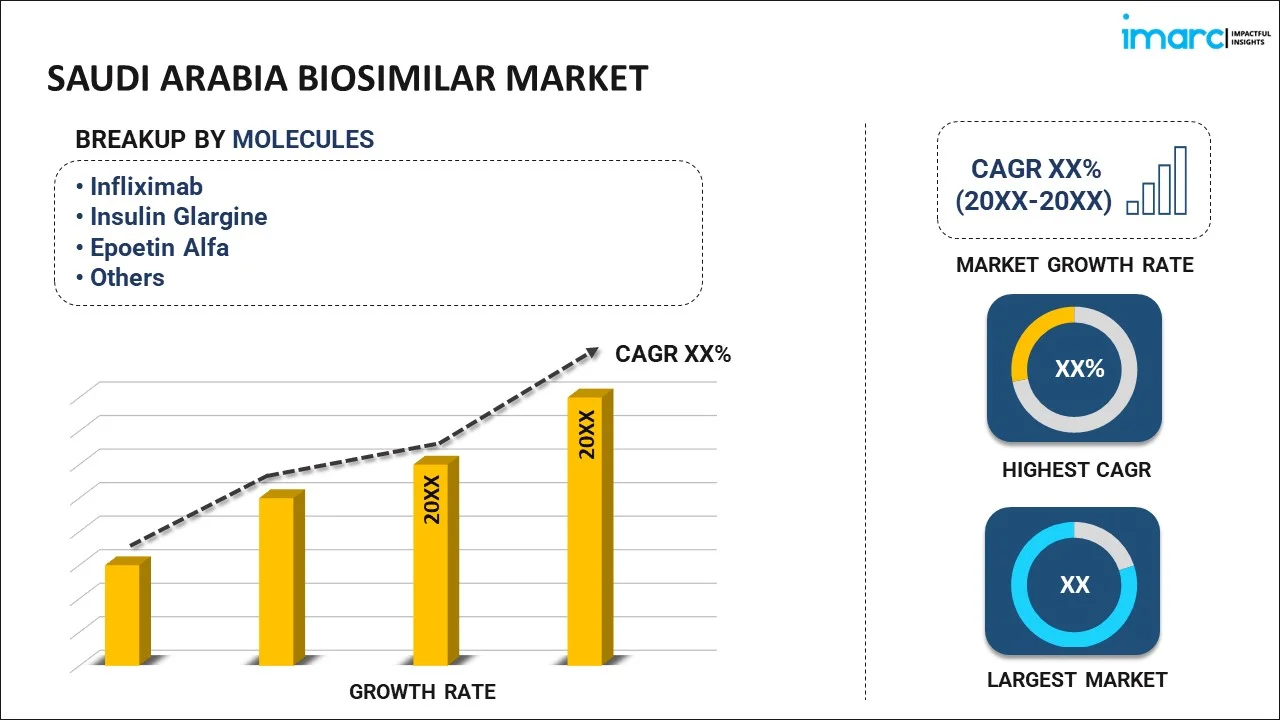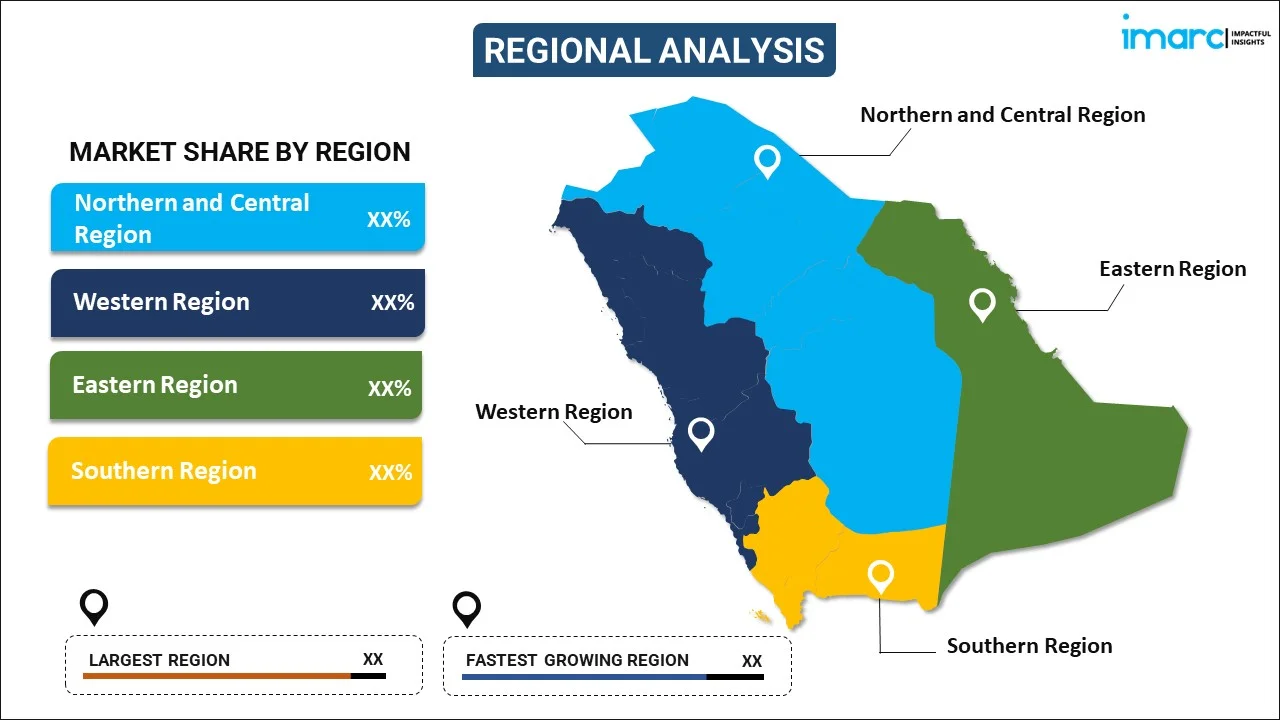
Saudi Arabia Biosimilar Market Report by Molecule (Infliximab, Insulin Glargine, Epoetin Alfa, Etanercept, Filgrastim, Somatropin, Rituximab, Follitropin Alfa, Adalimumab, Pegfilgrastim, Trastuzumab, Bevacizumab, and Others), Indication (Auto-Immune Diseases, Blood Disorder, Diabetes, Oncology, Growth Deficiency, Female Infertility, and Others), Manufacturing Type (In-House Manufacturing, Contract Manufacturing), and Region 2026-2034
Market Overview:
Saudi Arabia biosimilar market size reached USD 664.2 Million in 2025. Looking forward, IMARC Group expects the market to reach USD 1,990.5 Million by 2034, exhibiting a growth rate (CAGR) of 12.97% during 2026-2034. The rising focus on providing patients with access to effective and more affordable treatment options is primarily driving the market growth.
|
Report Attribute
|
Key Statistics
|
|---|---|
|
Base Year
|
2025
|
|
Forecast Years
|
2026-2034
|
|
Historical Years
|
2020-2025
|
| Market Size in 2025 | USD 664.2 Million |
| Market Forecast in 2034 | USD 1,990.5 Million |
| Market Growth Rate 2026-2034 | 12.97% |
Biosimilars are biological products designed to closely resemble and exhibit no clinically significant differences from an already FDA-approved reference product. These products are crafted to mirror the original in terms of mechanism of action, route of administration, dosage form, and strength. Although they are not identical due to the intricate nature and production methods involved in biologics, biosimilars maintain comparable levels of safety, purity, and potency. Acting as more affordable alternatives to high-cost reference biologics, these biologic drugs foster competition, ultimately enhancing accessibility to treatment for patients. The entry of biosimilars into the market undergoes rigorous testing and stringent regulatory scrutiny, ensuring therapeutic equivalence and prioritizing patient safety. In recent years, biosimilars have gained significant traction across various therapeutic areas, including oncology, diabetes, and autoimmune diseases.
Saudi Arabia Biosimilar Market Trends:
The biosimilar market in Saudi Arabia is emerging as a dynamic and impactful sector within the country's healthcare landscape. These biologic drugs, while not identical to the reference products due to the complexities of their nature and production methods, maintain comparable levels of safety, purity, and potency. Their introduction to the market undergoes rigorous testing and stringent regulatory scrutiny to ensure therapeutic equivalence and uphold patient safety standards. The Saudi Arabia biosimilar market is characterized by a growing demand for these products, driven by the need to address rising healthcare costs and improve patient access to advanced therapies. Besides this, as the country continues to prioritize healthcare innovation and affordability, biosimilars contribute to creating a competitive pharmaceutical landscape. The cost-effectiveness of biosimilars fosters competition, ultimately benefiting patients and healthcare providers. Moreover, the regulatory framework in Saudi Arabia ensures that biosimilars meet stringent standards, assuring both healthcare professionals and patients of their safety and efficacy. The increasing acceptance and adoption of biosimilars in Saudi Arabia align with the emerging trend towards harnessing the potential of these biologic drugs. With ongoing advancements and investments in the healthcare sector, the biosimilar market in Saudi Arabia is poised for sustained growth in the coming years.
Saudi Arabia Biosimilar Market Segmentation:
IMARC Group provides an analysis of the key trends in each segment of the market, along with forecasts at the country level for 2026-2034. Our report has categorized the market based on molecule, indication, and manufacturing type.
Molecule Insights:

- Infliximab
- Insulin Glargine
- Epoetin Alfa
- Etanercept
- Filgrastim
- Somatropin
- Rituximab
- Follitropin Alfa
- Adalimumab
- Pegfilgrastim
- Trastuzumab
- Bevacizumab
- Others
The report has provided a detailed breakup and analysis of the market based on the molecule. This includes infliximab, insulin glargine, epoetin alfa, etanercept, filgrastim, somatropin, rituximab follitropin alfa, adalimumab, pegfilgrastim, trastuzumab, bevacizumab, and others.
Indication Insights:
- Auto-Immune Diseases
- Blood Disorder
- Diabetes
- Oncology
- Growth Deficiency
- Female Infertility
- Others
A detailed breakup and analysis of the market based on the indication have also been provided in the report. This includes auto-immune diseases, blood disorder, diabetes, oncology, growth deficiency, female infertility, and others.
Manufacturing Type Insights:
- In-House Manufacturing
- Contract Manufacturing
The report has provided a detailed breakup and analysis of the market based on the manufacturing type. This includes in-house manufacturing and contract manufacturing.
Regional Insights:

- Northern and Central Region
- Western Region
- Eastern Region
- Southern Region
The report has also provided a comprehensive analysis of all the major regional markets, which include Northern and Central Region, Western Region, Eastern Region, and Southern Region.
Competitive Landscape:
The market research report has also provided a comprehensive analysis of the competitive landscape in the market. Competitive analysis such as market structure, key player positioning, top winning strategies, competitive dashboard, and company evaluation quadrant has been covered in the report. Also, detailed profiles of all major companies have been provided.
Saudi Arabia Biosimilar Market Report Coverage:
| Report Features | Details |
|---|---|
| Base Year of the Analysis | 2025 |
| Historical Period | 2020-2025 |
| Forecast Period | 2026-2034 |
| Units | Million USD |
| Scope of the Report | Exploration of Historical and Forecast Trends, Industry Catalysts and Challenges, Segment-Wise Historical and Predictive Market Assessment:
|
| Molecules Covered | Infliximab, Insulin Glargine, Epoetin Alfa, Etanercept, Filgrastim, Somatropin, Rituximab, Follitropin Alfa, Adalimumab, Pegfilgrastim, Trastuzumab, Bevacizumab, Others |
| Indications Covered | Auto-Immune Diseases, Blood Disorder, Diabetes, Oncology, Growth Deficiency, Female Infertility, Others |
| Manufacturing Types Covered | In-House Manufacturing, Contract Manufacturing |
| Regions Covered | Northern and Central Region, Western Region, Eastern Region, Southern Region |
| Customization Scope | 10% Free Customization |
| Post-Sale Analyst Support | 10-12 Weeks |
| Delivery Format | PDF and Excel through Email (We can also provide the editable version of the report in PPT/Word format on special request) |
Key Questions Answered in This Report:
- How has the Saudi Arabia biosimilar market performed so far and how will it perform in the coming years?
- What has been the impact of COVID-19 on the Saudi Arabia biosimilar market?
- What is the breakup of the Saudi Arabia biosimilar market on the basis of molecule?
- What is the breakup of the Saudi Arabia biosimilar market on the basis of indication?
- What is the breakup of the Saudi Arabia biosimilar market on the basis of manufacturing type?
- What are the various stages in the value chain of the Saudi Arabia biosimilar market?
- What are the key driving factors and challenges in the Saudi Arabia biosimilar?
- What is the structure of the Saudi Arabia biosimilar market and who are the key players?
- What is the degree of competition in the Saudi Arabia biosimilar market?
Key Benefits for Stakeholders:
- IMARC’s industry report offers a comprehensive quantitative analysis of various market segments, historical and current market trends, market forecasts, and dynamics of the Saudi Arabia biosimilar market from 2020-2034.
- The research report provides the latest information on the market drivers, challenges, and opportunities in the Saudi Arabia biosimilar market.
- Porter's five forces analysis assist stakeholders in assessing the impact of new entrants, competitive rivalry, supplier power, buyer power, and the threat of substitution. It helps stakeholders to analyze the level of competition within the Saudi Arabia biosimilar industry and its attractiveness.
- Competitive landscape allows stakeholders to understand their competitive environment and provides an insight into the current positions of key players in the market.
Need more help?
- Speak to our experienced analysts for insights on the current market scenarios.
- Include additional segments and countries to customize the report as per your requirement.
- Gain an unparalleled competitive advantage in your domain by understanding how to utilize the report and positively impacting your operations and revenue.
- For further assistance, please connect with our analysts.
 Request Customization
Request Customization
 Speak to an Analyst
Speak to an Analyst
 Request Brochure
Request Brochure
 Inquire Before Buying
Inquire Before Buying




.webp)




.webp)












